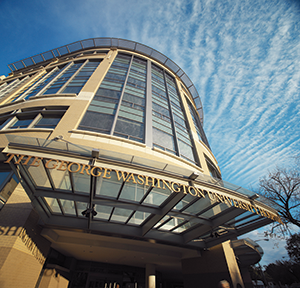The George Washington University Hospital (GW Hospital) recently earned accreditation as a Comprehensive Stroke Center from the Joint Commission and American Heart Association/American Stroke Association, making it one of fewer than 100 hospitals nationwide to receive the recognition.

Accreditation as a Comprehensive Stroke Center means that GW Hospital — now part of an elite group of providers focused on complex stroke care — has met the commission’s upgraded standards for disease-specific care. Comprehensive Stroke Centers are recognized as industry leaders and are responsible for setting the national agenda in highly specialized stroke care.
“This designation demonstrates not only the unique expertise of our physicians, but also the exacting collaborative procedures that GW Hospital has developed involving everyone from the transport staff, technologists, nurses, and physicians to the CEO and hospital leadership,” said Henry Kaminski, M.D., chair of the Department of Neurology and Meta Amalia Neumann Professor at the GW School of Medicine and Health Sciences (SMHS).
The Joint Commission instituted a new level of certification in September 2012 to identify the facilities with the resources, staff, and training, such as advanced imaging capabilities and 24/7 availability of specialized treatments, necessary for the care of complex stroke cases. The Commission established a rigorous on-site review process to ensure compliance with the higher standards and requirements. To date, less than 2 percent of U.S. hospitals have achieved certification as Comprehensive Stroke Centers.
“The saying goes, ‘time is brain,’” continued Kaminski. “The longer you wait, the greater the likelihood that you’ll have permanent damage.”
SMHS, GW Hospital, and the GW Medical Faculty Associates created a stroke team, available 24 hours a day, to provide essential treatment from the moment patients arrive, for “what we call ‘door-to-needle’ time,” Kaminski explained.
Kaminski added, Kathleen Burger, D.O., assistant professor of neurology at SMHS, who coordinates the stroke team, “has led an initiative that has experienced phenomenal results, with a door-to-needle time of around 60 minutes,” which puts the hospital in the top tier of centers across the country and makes it the best in the Washington, D.C. metro area.



